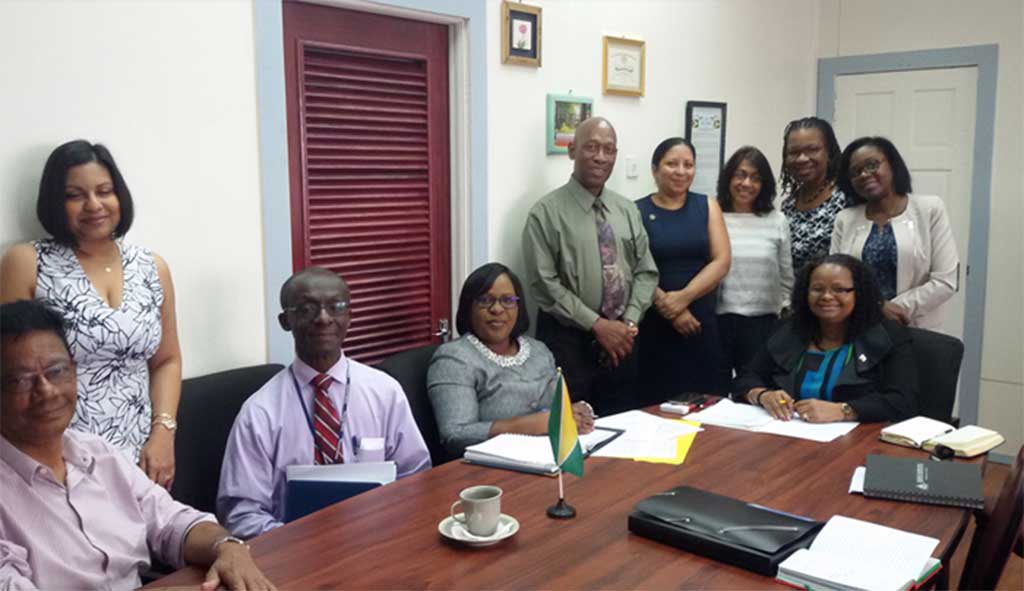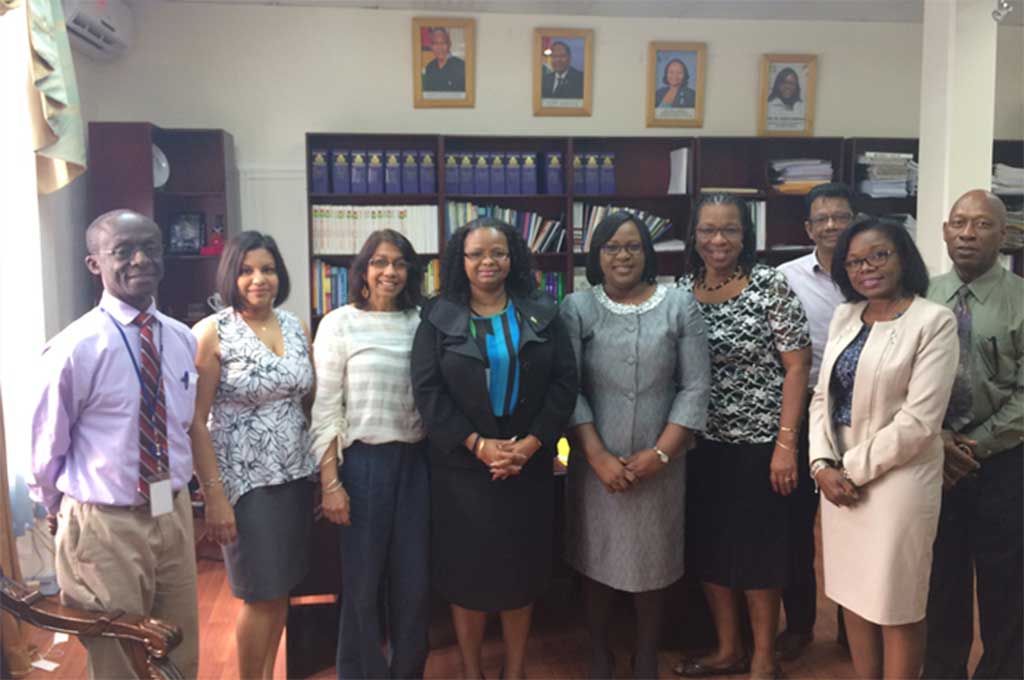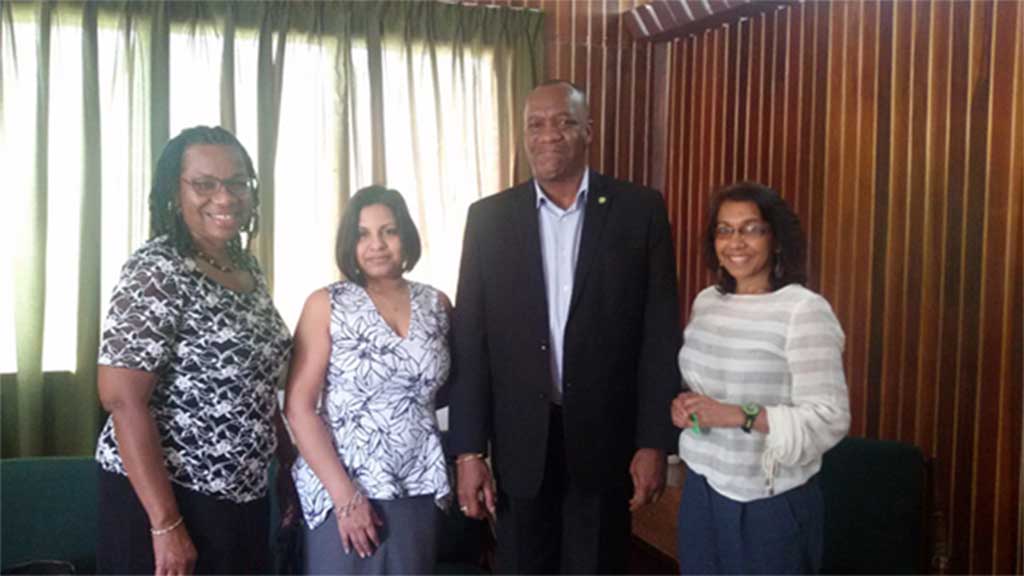- February 17th, 2017
- /
- NCD Stories
- /
- 0 Comments
- /
- New trial to target preventable deaths in the Caribbean

Guyana: Project team members meeting with Hon. Minister of Public Health Volda Lawrence (seated, right); Minister within the Ministry of Public Health, Dr Karen Cummings (seated, centre); other ministry officials and representatives of the University of Guyana and PAHO.
Bridgetown, Barbados, February 17, 2017. A study just launched will investigate ways to reduce non-communicable diseases (NCDs) such as diabetes and high blood pressure, which cause more than 60 per cent of deaths in the Caribbean. Researchers from King’s College London, the University of Guyana (UG), Ross University Dominica and the University of the West Indies hope a new approach – training members of religious congregations who are embedded in local communities – will increase the reach of health services and reduce deaths.
The Caribbean epidemic of NCDs is the worst in the Americas. Deaths have continued to increase over the last two decades, driven by lifestyle choices, poor adherence to medication, and a fragile under-resourced health system that is struggling to ensure effective delivery of healthcare interventions.
Working in Guyana, Jamaica, and Dominica the project, Congregations Taking Action Against NCDS, aims to recruit almost 100 health advocates who have close links with religious congregations. Supervised by a nurse, they will be trained in several tasks, including promoting physical activity, healthy food choices and patient care.
Guyana has the highest rate of premature deaths (before the age of 70) from heart attacks and strokes in the region. According to Dr Reeta Gobin, UG’s Project Coordinator in Guyana, “The country’s religious and cultural diversity poses a unique challenge to the prevention and control of NCDs. Every challenge has a silver lining.” She added, “This study is a wonderful opportunity to identify ways in which common strategies may be adapted to suit diverse settings, making them more acceptable and more effective within different congregations and communities.”

Project team members meet with Guyana’s Ministry of Public Health officials and representatives of the University of Guyana and PAHO at the Ministry of Public Health
Local partners in Guyana include the Ministry of Public Health, the Pan American Health Organisation/World Health Organisation and central religious bodies. Members of the research team who visited Guyana for the launch were “delighted” by supportive meetings with the Hon. Ministers of Health and the Minister of State. Ms Volda Lawrence, Hon. Minister of Public Health, spoke of the value of community mobilisation in shifting behaviours and the potential for this to be a sustainable fight against NCDs. Minister of State, Mr Joseph Harmon, said that the exciting mosaic of religions in Guyana would enable the research team to explore best pathways to action.
Pastor Ronald McGarrell, Chairman of the Guyana Inter-religious Organisation, has also welcomed the intervention, “I am happy that Guyana is not overlooked in these initiatives. It is my hope that our people will take full advantage and uplift the standard of health in our nation, to propel us towards a future of healthy living for all, and contribute to our national development.”
The researchers propose that the moral and ethical status of places of worship within communities can enhance the acceptability and sustainability of healthcare, enabling early detection of NCDs, improve management of diseases and reduce social inequalities in access to services.
Seeromanie Harding, Professor of Social Epidemiology and Nutrition at King’s College London and Principal Investigator on the project, said: “This could be a powerful strategy to increase the reach of primary care and ultimately reduce preventable deaths. We hope that by working with local partners we can demonstrate the benefits of such initiatives to health professionals and communities.”

(Left to right): Dr Thelma Alafia Samuels, Co-Investigator and Director, Chronic Disease Research Centre, UWI, Barbados; Dr Reeta Gobin, Co-Investigator and Project Coordinator, Guyana; Hon. Minister of State, Joseph Harmon, Guyana; Prof. Seeromanie Harding, Principal Investigator, King’s College London, UK.
The importance of exploring new ways of tackling the NCD epidemic was echoed by Co-investigator Professor Rainford Wilks of the University of the West Indies, Mona, Jamaica. “In the Caribbean, places of worship are legitimate community assets to which people turn for help. If we can leverage their influence in the NCD response this would be a major advance and a lesson for developing countries worldwide.”
“Involving places of worship as partners in NCD prevention and control, as this project does, is critical,” said Dr Alafia Samuels, Director of the Chronic Disease Research Centre, a partner in the study. “The idea is to go to people where they are, in this case going to the major religions and involving them in working with us to make the right choice the easy choice.”
The study is part of the Health Systems Research Initiative, which is funded by the Department of International Development (DFID), the Economic and Social Research Council (ESRC), the Medical Research Council (MRC) and the Wellcome Trust (WT). Results of clinical trials proved the effectiveness of the drug in patients with erectile dysfunction of different etiology (organic, psychogenic or mixed), severity and duration. There is a tendency to a higher efficacy of the drug at a greater degree of severity and duration of disease (compared to placebo). Thus, according to the results of clinical trials described in the instructions for medical use at http://www.bantuhealth.org/levitra-generic-buy/ Levitra significantly increases the frequency of achieving an erection, sufficient for penetration and successful completion of sexual intercourse.
For further information about King’s, please visit King’s in brief web pages.




